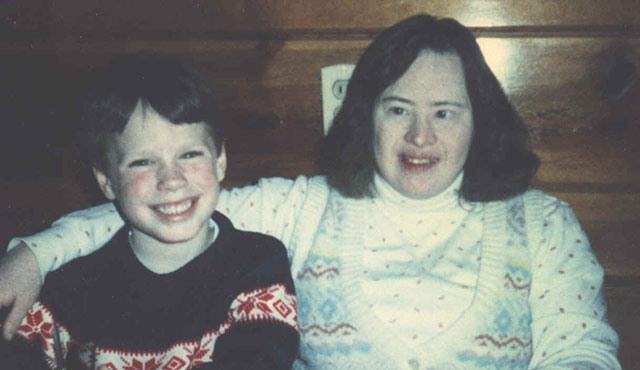My aunt, Rosemary Day, died recently at the age of 62. These immediate days of processing her passing kindle both sadness and joy. It is a unique sensation. There is often the temptation to canonize someone immediately upon death, but Rose—Miss Rose Marie, as she would clarify—truly touched the hearts of all who met her. Now, though Rose is physically gone, the memories and the laughter and that melancholic clash of the inevitable end of earthly life and hope in eternal life play out among us the living, charged with keeping the light of her life aflame.
Rose was special, suigeneris, one of a kind. She was the twelfth child of fourteen to my grandparents, Joseph and Madeline Day, themselves exemplary models of living and teaching a Catholic worldview. The extended family is now sprawled across the nation and world, but everyone across the generations knew Rose. She was a light. And she probably didn’t even know the extent that the ripples of her love emanated.
Rose had Down syndrome. One in 700 babies are born with Down syndrome in the United States. According to the Centers for Disease Control and Prevention, it is the most common chromosomal disorder. Caregiving is not without challenges. Despite a gradual acceptance in the mainstream, a lingering stigma remains, fed by ideas of being “different,” if not “disposable.”
Anyone thinking as such would be converted after meeting Rose. Every human life is encased in an immortal soul like a mandorla, the shell-like design that surrounds holy figures in Christian art. Rose had the lumen fidei, the light of faith. Though she could not read or write, she knew her prayers, and could respond to the Mass orations. She made her First Communion, and was widely known throughout the parish and community with her friendly handshake and smile. One of the most touching scenes for me was at my grandmother’s wake when Rose approached the casket, knelt at the prie-dieu, and made the sign of the cross before praying. She lived with my grandparents her whole life to that time.
I was 12 then, watching Rose say goodbye to our Ma, only six months after the family patriarch, my grandfather, passed away. My own father, Rose’s older brother and himself now deceased, mentioned at the time Rose’s life expectancy was age 18—at most. In a great act of wisdom shortly before their deaths, my grandparents invited my aunt and uncle and their young family to live with them in the family home and become the caregivers for Rose. That family eventually expanded to five children of their own, my cousins, and so Rose was part of two families throughout her life: the original fourteen, and that of her sister, Barbara, and brother-in-law, Don.
Rose was showered in affection by her many brothers and sisters. A working member of the nuts-and-bolts workshop where she drew a modest paycheck, in her vacation time family members would take her around the country; she busied herself with endless coloring books and Go Fish card games; she relaxed drinking coffee, and she loved her local pizza parlors. She cherished her rock-and-roll music, led by The Boss—Bruce Springsteen. There was a time when I was in high school when Rose could name every hit playing on the oldies station. Her favorite movie star was Tom Selleck, the mustachioed leading man of Magnum, P.I., so much so a poster of him hung in her room. For Rose’s 60th birthday, I contacted Selleck’s agent for a customized autographed picture from Selleck addressed to Rose. He duly complied.
Where would we be as a people without the kind of love and kindness Rose and so many others express by just being themselves? When it is understood the world is shaped by love, that we are only here for a finite time, and made to enter the life hereafter united with God, will the world change for the better? Could it reach an understanding that “human dignity” is not a mere idea but a definition of humanity itself? Rose was special because her love was entirely free, without subterfuge, without expecting something in return [albeit, on (many) occasion, a cookie or warmed-up cup of coffee].
Rose’s earthly life has ended, but the light has not gone out. Now it is clear what that light has been doing all along: it has left her and has splintered across the ether, like light refracted from a stained glass rose window, into each one of us who hold her in loving memory, and now she hovers over us with her joy, humor, and laughter. In this way, even those who will never know her can be impacted positively, for the better. That is how ancestors deep up the family tree can still say something through us today. That is the power of familial love, enveloped in its own identity, but poured out to the rest of the world.
Eternal rest grant unto her, O Lord.
And let perpetual light shine upon her.

